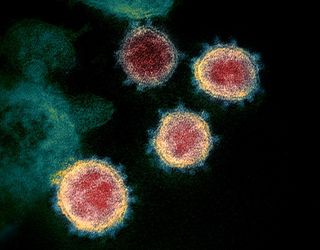Sleep
Sleep in the Time of Pandemic
Good sleep is especially important now.
Posted March 17, 2020 Reviewed by Jessica Schrader

As I write this, we have just finished a very challenging week in which COVID-19 was declared a pandemic, the stock market declined during unusually volatile trading, and the United States began to close down as global infection rates and deaths steadily increased. It was the week that the full psychological impact of COVID-19 began to hit home for most people.
Unlike recent natural and human-caused disasters, which have often brought people together and brought out the best in many, this disease requires “social distancing” to help slow its spread, and that can result in serious feelings of fear and isolation. We also know from previous pandemics, such as the 1918 influenza, that not using social distancing and quarantine effectively can be disastrous.
By now, most people have seen the graphic showing that social distancing can help spread out the effects of a pandemic and slow the rate of infection, although not the absolute number of infections. This is important as it decreases the strain on the health care system that would otherwise occur if huge numbers of people were to get sick at once and overload existing medical resources. That could lead to forced triage where the old and infirm could be deemed too sick to save because health care resources are stretched to the limit and must be focused on those most likely to recover. This is already happening in hard-hit Italy.
We are now dealing with an apparently more infectious and potentially more lethal illness than the standard influenza we experience every year. Fortunately, we have better tools for tracking the spread of a pandemic than we’ve had in the past and medical science is better equipped to work on ways of treating and preventing such illnesses than ever before. We depend on governments to help in this process. That has been a problem during this pandemic but hopefully is being addressed.
Many who can are now working from home to help slow the spread of the coronavirus. Some are finding that this situation has its own stresses and difficulties, not the least of which is social isolation and potentially decreased creativity and innovation that can occur when working away from colleagues. I like using teleconferencing but do not find it a full replacement for contact in the real world. Being aware of and finding ways of coping with this kind of stress will be important during the next weeks and months.
Fortunately, unlike during the 1918 pandemic, we currently have resources that people in the past did not. For example, we have highly skilled public health scientists and professionals whose recommendations can help contain the spread of COVID-19. We also have better ways of tracking the progression of the pandemic, although this has been hampered by the lack of testing for the virus.
Sleep is important in defense against infection and sleep is itself significantly affected by infection, whether due to bacteria or viruses. Sleep is definitely one of the things to be sure you get enough of during this challenging time along with all of the recommendations that have been made for protecting yourself against getting sick and for slowing the spread of the illness in society.
Since ancient times, the role of sleep in disease has been recognized and recommendations to get enough sleep or risk getting sick are common (Opp & Krueger, 2017). In the past few decades, scientists have begun to learn how this actually occurs. Significant evidence now shows that insufficient sleep has health consequences (Siobhan, Dorrian, Basner, & Dinges, 2017). Immune function changes in such factors as natural killer cell activity and interleukin-6 have been demonstrated for both sleep restriction and sleep deprivation (Siobhan et al, 2017).
Viral diseases that cause systemic inflammation do change sleep (Opp & Krueger, 2017). Influenza is different from COVID-19 but it has been used as a model for understanding the effects of viral infections on sleep. Major effects on sleep that have been found to result from infection include increased length of sleep and decreased cognitive performance. In animals, injections of influenza virus have been shown to increase NREM sleep and suppress REM sleep. This increased sleep time and decreased cognitive functioning are some of the reasons to be concerned about using daytime cold and flu medications that allow people to suppress symptoms and go to work even if ill. These medications could be blocking the body’s natural efforts to combat illness and hamper efforts to prevent the spread of illness. Under the conditions of the current pandemic, it is extremely important to not go to work if you are experiencing symptoms of illness as this could further spread it.
Sleep definitely does change in response to infection but it is more difficult to determine the effects of sleep on immune function (Opp & Krueger, 2017). The sleep and immune systems are both extremely complex and have intricate positive and negative feedback mechanisms that interact with each other. The evidence to date indicates that long term sleep loss suppresses immune function and increases vulnerability to infection.
Another aspect of the current situation is the importance of protecting yourself against infection at night, especially if you are older and have other health concerns. An interesting article on this was written by Dr. Bruce Davidson and is worth a quick read. His recommendations to prevent aspiration of the virus during sleep include washing your hands and face, including a quarter-inch into the nostrils, and gently blowing the nose. This should be followed by brushing the teeth and tongue and then gargling one or twice with antiseptic mouthwash. As he says, “The key is to minimize the virus burden around and inside your face before you go to sleep.”
Even in these challenging times, some have found a way to post humorous memes on Facebook about sleep and the pandemic: “There’s a thing that helps strengthen your immune system, reduces anxiety, feels great, has no carbs, no calories, and can be taken nearly anywhere. It’s a nap. Let’s take a nap." –Simon Holland, The Dissertation Coach.
COVID-19 is a novel coronavirus for which there is no pre-existing immunity and for which there are currently no vaccines available to confer immunity to it. Preventing and reducing the continued spread of the illness needs to be our top priority at this time. Being strong enough to fight it off if you do become infected is also important. Just getting good sleep alone will not save us from COVID-19, but strengthening our immune systems and managing our stress are important goals. The use of standard good sleep hygiene practices is prudent at this time. In the stress of trying to carry on life in the time of pandemic, do not neglect to get the sleep you need. Good sleep is definitely a part of staying healthy and fighting off illness.
References
Opp, M.R. & Krueger, J.M., (2017). Sleep and Host Defense, in Kryger, M., Roth, T., & Dement, W. C. (Eds.), (2017). Principles and Practice of Sleep Medicine, Sixth Edition. Philadelphia, PA: Elsevier.
Siobhan, B., Dorrian, J., Basner, M., & Dinges, D.F. (2017). Sleep Deprivation, in Kryger, M., Roth, T., & Dement, W. C. (Eds.), (2017). Principles and Practice of Sleep Medicine, Sixth Edition. Philadelphia, PA: Elsevier.




